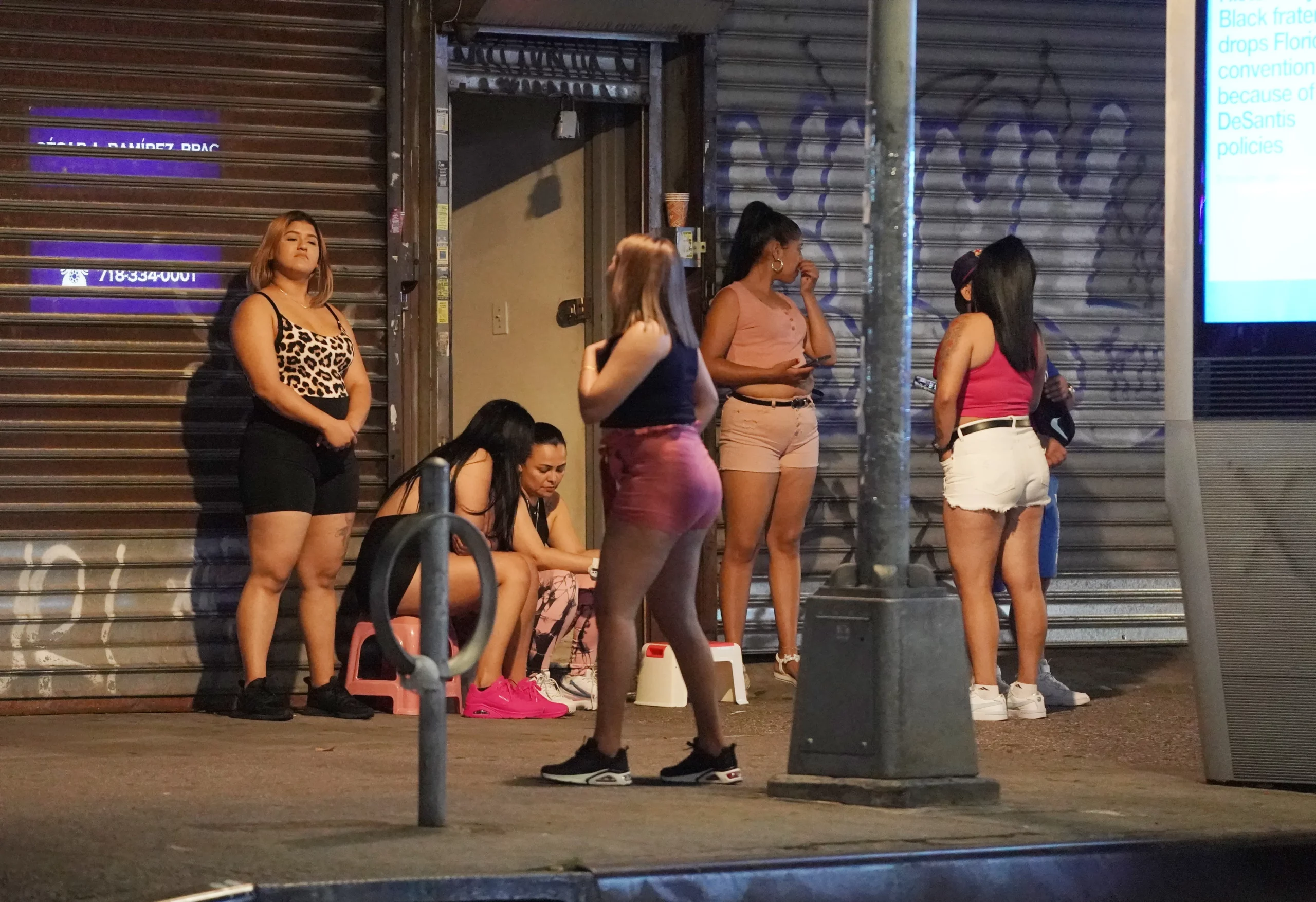
By Kieron Murdoch | Opinion Contributor
A news report three weeks ago of two “working women” who were standing in the street next to their place of business one night being struck by an overtaking car got us thinking about the topic of prostitution in Antigua and Barbuda once again. Needless to say, we hope that the women were not seriously injured.
It would be quite understandable if the average person became confused as to whether or not prostitution itself was illegal in Antigua and Barbuda, as appearances suggest that it tends to go on without much ado. For as long as some have been alive, Popehead Street and the surrounding environs have been almost a designated district for such activity.
There are numerous other venues, corners, and streets from which the sex trade is offered. In most instances, these centers of activity are well-known to communities. And it seems fair to say that over time, various reports, interviews, and surveys have demonstrated that prostitution is a constant in these islands.
One thinks back to the campaign leading up to the January 2023 general election and remembers an older female attendee at a Labour Party townhall styled event asking members of the head table, to include Melford Nicholas MP and Gaston Browne MP, what if anything could be done about “the prostitutes” in her community. When she did not get an immediate answer, she emphasized her point, saying “the hoes” were keeping her up at night. Her comment elicited hushed murmurs at first, then a round of subdued laughter from the room.
When it comes to the law itself, the Sexual Offences Act of 1995 makes it a crime to “keep, manage or assist in the management of a brothel” or to knowingly be a landlord, tenant, lessor, lessee, occupier, or person in charge of any premises used in whole or in part as a brothel or place of prostitution. It is also a crime to live off the earnings of a prostitute. Anyone who “in any place solicits for immoral purposes” is also committing an offense.
The Trafficking in Persons Prevention Act of 2010 creates a framework for recognizing when a person is considered a victim of trafficking and criminalizes those who both traffick in persons or who thereafter compel trafficked persons into prostitution (among many other things) or any other form of sexual exploitation. This is highly relevant when you consider that many sex workers are foreign nationals reportedly from other Caribbean countries.
Prostitution occurs everywhere, in every country, across all cultures, and throughout the history of civilizations. This acknowledgment is important for us to understand that it is not a unique issue to our society by any means. However, its prevalence throughout time and culture is not a reason for us not to seek to address the challenges it creates.
Afterall, many things have been prevalent throughout time and across cultures – forced labour, the exploitation of children – and that has not stopped us from trying to address them nonetheless. It is important however to remind ourselves of what of what potential problems may need to be addressed and not to be guided by an overly moralistic approach.
In a society like ours where Christianity is the predominant organised religious influence on people’s thinking, there are many who would say that prostitution is an ill merely because it involves people – prostitutes – having lots of sex with lots of people. For persons who take this view, it is the institutionalised promiscuity that they find morally outrageous. But we would not join them in taking such a view.
Consenting adults should generally be free to engage in sex on their own terms with the only restrictions being those imposed to prevent harm, exploitation and other negative outcomes. Merely having lots of sex with lots of people cannot be a grounds for one to be criminalised in a rational society with secular laws. Perhaps in a theocracy, yes.
So, why is prostitution supposedly bad? Or rather, what is it about prostitution that makes it a problem? In trying to answer that question, we find ourselves focusing on the status of prostitutes themselves and the nature of what they do.
One view is that prostitutes should be seen as victims of a society with an inherent power imbalance between the genders and where social and class inequality tend to limit opportunities for the least privileged. Such a view would also find that the prevalence of male power works to create an enabling evironment around prostitution.
Such a view would find that prostitutes are in their trade because society created the pressures that put them there – that they come exclusively from amongst the least privileged of persons, that they began the trade when they were in the toughest of circumstances, that many were forced or coerced to start, that many are victims of trafficking, pimping, and coersion; that they have little agency; and that the stigma, judgement, and lack of respect assigned to them by society, as well as lack of alternative opportunities works against them getting out of the trade.
Alternatively, another view would find that prostitutes play their trade because it is a lucrative trade to ply; that not everyone is a victim of coersion; that many maintain agency and power over what they do, who they do it with, and where and when they do it; and that the stigma, judgement, and lack of respect assigned to them by society, only works against the strengthening of controls and safety around the trade.
There is likely a measure of truth to either perspective, as no one person’s story is the same. So, should we concern ourselves with eliminating prostitution? Or should we concern ourselves with elevating the status of prostitutes such that we reduce the more seedy, illicit and depraved elements that are attached to the trade? And how would one go about doing either?
We will address that in Part 2 on Monday, December 9th, 2024.
In the meantime, we would encourage you to read this article on the topic of sex trafficking in the Caribbean published in September. It features the story of a Jamaican woman who was once tricked into coming to Antigua a decade and half ago to work in the sex trade.
“Tricked into Sex Slavery: Global Crackdown hasn’t Stopped Caribbean Traffickers”
Tricked into Sex Slavery: Global Crackdown hasn’t Stopped Caribbean Traffickers
About the writer:
Kieron Murdoch is an opinion contributor at antigua.news. He worked as a journalist and later as a radio presenter in Antigua and Barbuda for eight years, covering politics and governance especially. If you have an opinion on the issues raised in this editorial and you would like to submit a response by email to be considered for publication, please email [email protected].






This should be a very interesting point. Its not understandable how this kind of thing is legal
According to law prostitution is illegal in any form in Antigua/Barbuda no exceptions..so what’s all the confusion and hesitation about???
Do remember if you move prostitution you will have more rape out there so think about that it’s best to make those men bleed off by paying then to have them hold down people
I totally agree.
Prostitution is one of the oldest professions in the world. The issue is not with prostitution itself—meaning the choice to offer one’s body for money—because every individual should have the freedom to do what they wish with their own body and life.
The real problem lies in the exploitation associated with prostitution. This includes the unscrupulous individuals who take advantage of those who either choose or are forced into prostitution, often seizing a significant portion of their earnings or even enslaving them.
No one should have the right to exploit those who decide to engage in prostitution. This exploitation represents the darker side of the issue.
Furthermore, the ethical argument against prostitution seems hollow. If we were to apply that reasoning consistently, we would have to judge and prosecute young girls who marry older men solely for financial security—something that occurs frequently around the world. This too is a form of prostitution, but few are willing to acknowledge it.
Actually according to experts, men don’t rape women simply because they are “horny”. Men who rape are commiting an act of violence using sex as the tool or weapon. They want to hurt the woman by dominating and controlling her via sex. It’s not really about the sex, it’s about other underlying issues. So, prostitution does not solve that unless you think it’s ok to dominate and control the prostitutes instead?
They should have prostitution taken off completely and get some jobs for these ladies
The moral argument against prostitution is not just about having lots of sex. Christians like sex too. The moral argument is based on the destruction of family life and the devaluing of the individual who reduces themselves to a piece of meat for money. Just like being a slave would not make a person happy in the long run, neither will being a prostitute. Instead it will lead to feelings of low self worth. Also, scientifically, sex causes bonding hormones to be released. It’s not just a utilitarian activity. It is meant to bond two people together to create a family to stay together for the children. So, when prostitution occurs people can be left emotionally hurt as they develop feelings for persons they can never be with for life. There is also the disease aspect. It is an unnecessarily risky activity for all parties and affects the health of everyone in society. In our poor society we can’t afford such an unnecessary healthcare burden. Even for that reason alone, prostitution should be illegal.